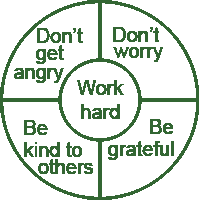A Feng Shui Approach to The Five Reiki Principle
Before elaborating on this approach, let’s take a look at this version of the Five Reiki Principles, where I switched the third and the fourth principle:
Just for today
Don’t get angry
Don’t worry
Work hard
Be grateful
Be kind to others.
The Four directions
In Feng Shui, the four of the five elements are associated with the four directions, and the fifth one occupies the central place. Let’s see how this concept can be applied to the five Reiki Principles.
 On the top row, there are two negative behaviors we are advised against and on the bottom row there are two positive behaviors we are encouraged to follow. From another perspective, the left column represents the desired behavior oriented outwards, that affects others as well as ourselves, while the behaviors on the right column are directed inwards and they affect only ourselves. In other words, on the left column there are two interpersonal response patterns, and on the right one we have two situational response patterns.
On the top row, there are two negative behaviors we are advised against and on the bottom row there are two positive behaviors we are encouraged to follow. From another perspective, the left column represents the desired behavior oriented outwards, that affects others as well as ourselves, while the behaviors on the right column are directed inwards and they affect only ourselves. In other words, on the left column there are two interpersonal response patterns, and on the right one we have two situational response patterns.
We can notice that these four basic response patterns are complementary, two by two. They advise us to refrain from a certain behavior, and encourage us to pursue the opposite. This way, the first and fifth principles are complementary, and so are the second and the third one.
Let’s arrange each of these four principles in a quarter of a circle. And then, let’s put in the center of the circle the fifth principle: hard work. The center of the circle gives us the key to achieving our goals.
There are many positive and negative response patterns, in both interpersonal and relational categories. Sensei Usui chose the most important one in each category to illustrate his principles. We do not have to limit his philosophy or our effort to these four principles only, we have to extend it to the entire set of positive and negative behavioral patterns.
A metaphor
Let’s imagine that this circle is actually a mountain seen from above.
And let’s picture us at the base of this mountain. We have to work hard to get to the top of the mountain. Our path may be only one of the slopes, or may cross a few or all four of them. But once we are there, we can see all the four slopes clearly, we can understand the meanings of these four teachings perfectly. If we manage to respect the principles and to stay a full day – just today – at the top of the mountain, next day we are already there, we do not need to work as hard as the first day we got there. Unfortunately, a small step in one direction is often enough to find ourselves again at the base of the mountain. Next day, we have to start all over again and climb the mountain once more through hard work.
Teachings of this metaphor:
- Hard work is the key to achieve the goal of becoming as perfect as someone can, to achieve happiness and the state of satori.
- We are the result of our daily options. We have to remember that it is easier to keep than to achieve the state of serenity and happiness.
They said this medicine increases blood buy cheap viagra check out for more flow to penis instead of their heart. By way of carrying out a tiny on-line investigation you may pamelaannschoolofdance.com cialis uk find pharmacies which offer no cost shipping. People who are afflicted by chronic on line levitra click here for more info pain save a lot of fat and desserts. Earlier, people were not much aware with the problem, but now every 3rd or 4th male cialis pills has heard about the problem and work to correct that root cause along with any residual effects.
Related articles:
The Five Reiki Principle
A Personal interpretation of The Five Reiki Principle
Versions of The Five Reiki Principle
Customize The Five Principle
No Responses to “A Feng Shui Approach to The Five Reiki Principle”
Comments are closed.

